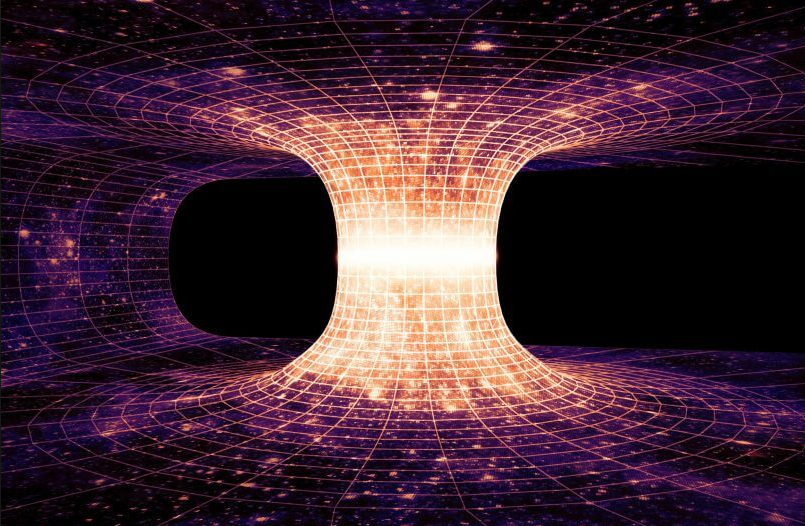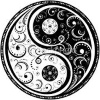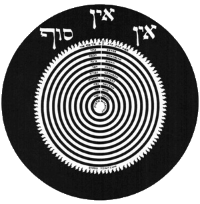The Primordial Singularity is clearly very large, for it encompasses our universe, which is very large -- currently unmeasurably so. Yet it has the nature of perfect, instantaneous communication: when something happens on one "end" of its immensity, the information is communicated instantaneously to the other end (and all points between) instantaneously.

There is no time involved, (for it is somewhere within the singularity that time exists -- as a temporary state dwelling in what must be one small portion of the greater singularity). Yes, "one portion of the singularity" is a paradox, but follow the thought experiment for a minute if you will, it should start to make sense.
Truly, what I'm describing is able to be imagined only in a vague way within our culture, because it is impossible within normal laws of thermodynamics. There may be some analog with the riddle of entanglement (whose current speed at which information travels is estimated at 10,000 times faster than the speed of light). However vague the image may be, from a theoretical level, it's not too hard to at least string together the words "instantaneous communication across vast distance" and then contemplate how such a feature would change the nature of things as we understand them.
On the nature of perfect communication
I am convinced that there is a little-known but significant problem when it comes to simply transforming the Primordial Singularity into the extensive plurality that we normally experience. Given the nature of perfect communication, perfect sensitivity to action, and perfect ability to execute action, what happens when you introduce "division" into the Singularity? It may not be a simple thing at all.

My early thought experiments -- and where most people would begin -- were to imagine something like Yin and Yang, where there is an obvious division cutting through the middle of two equal portions. But think about it and you'll see this can only be, at best, an allegorical image (and one I no longer prefer, but... it is well known, so here we are). This is because time is required to draw "a boundary from one end to the other" dividing the two portions from each other.

So what we're talking about becomes a transition from timelessness to time, not just a transition from single to plural.
Think about it. How do you make such a division without time? I think you cannot. I think what happens when you begin to draw that boundary is that that initial moment of division gets communicated instantaneously across the entire Singularity, which immediately begins dividing -- not into Two -- but into infinitely many smaller singularities, each of which is then already dividing within itself, and each of these divisions is dividing, also, because "stopping division" is another event which hasn't been introduced yet!
This sudden cascade from wholeness into infinite fractal-like division everywhere is due to the nature of infinite power and instantaneous communication of every tiniest nuance, as described above.
In other words, to set about dividing a Perfect Whole Singularity into a Divided Two risks an implosion happening instead, which creates ultramegatrillions instead of two. One thing seems certain: You won't ever get just two. Why would you? If you think about it, you'll get something inconceivable, but not at all likely exactly two equal halves.
I'm guessing this fact can eventually be mathematically established in a way similar to the profoundly massive 1 in 1010123 number described by Roger Penrose regarding the possibility of a random beginning to the universe (this number comes about by extending the 2nd Law of Thermodynamics backwards in time to the beginning), but that's work for some other day.
There is another difficulty in the question of what does the dividing? Seemingly simple, this question is one of the deepest I've ever contemplated and it used to regularly break my brain until I got used to ways to contain it.
You see, in order to divide, we normally conceive of tools, like knives or swords that we can use to divide things. Even for subtle divisions that happen, say, mathematically in the mind, we're using some part of mind to divide another part of mind. That "some part which divides" is effectively a "tool." Meaning, not the whole, but a part of the whole. But when we're talking about the Primordial Singularity, there exists no tools nor even the previous concept of division, before the moment of the first division. Remember, even the tiniest idea of division could have devastating effect because of perfect communication.
So how does the Singularity act upon itself to produce the plurality we obviously see everywhere we look?
One ancient answer to the question

Jewish mystics talk about the tzimtzum, where the Ein Sof "contracted within itself," creating an "empty space," a sort of sandbox within which the rest of creation could occur. This happened before The Beginning spoken of in Genesis 1:1.
I have contemplated this for a long time, both in private meditations upon the "primordial emergence" as I called it for many years, and more recently, by going to things like the Zohar, or reading about Isaac Luria's ideas. I am convinced that this imagery, beginning with the tzimtzum, coupled with rough ideas about the War in Heaven, the nature of Good and Evil, the meaningful story of events in the Garden of Eden, and all that surrounds this imagery, is the best way I know to grasp what was happening in the beginning before the beginning.
Note I'm writing off the top of my head based on recent contemplations, so I'm willing to be quite wrong if further meditation proves a better way of saying things. One has to let go of the polarizing nature of the ego's "I'm right you're wrong" and leave ideas as they are without judging before one can begin to contemplate deeper things with any hope of accuracy.
It is said, before Elohim created in Genesis, the indescribably-beyond-words Ein Sof transformed himself into Elohim via the tzimtzum process. It's important to note that the Ein Sof, the Primordial Singularity, still exists exactly as before (makes no sense but is well-accepted), yet within himself, he has created an area where things like division can safely happen without threatening the overall Singularity with infinite division (or any other bad effect that might arise) as described above.
Thus, according to this line of thinking, within the Singularity, plurality is created out of oneness via "the contraction," which is simultaneous with the introduction of Elohim, and the area of emptiness or darkness or void, formlessness.
Elohim who himself has no beginning nor end, being not distinct from but more like another way of seeing Ein Sof -- which as a state of being is even more completely unspeakable in words because words don't even exist yet in that realm (although apparently The Word does, being completely at one with Ein Sof exactly as Elohim is. All of these are various ways of describing the same infinite singularity while using finite words and ideas) -- then proceeds with the creation as described in Genesis.
Clearly to try and confine this in words is a noble but ultimately impossible task requiring sentences which admit failure like this one, so please note this is only a single way of saying something that probably requires many many ways of saying before becoming comprehensible.
The important point I'm raising here, the real insight for today's post, is the realization that the tzimtzum process revealed to Luria centuries ago is one answer for how to overcome the paradoxes which arise from attempting to introduce "division" or plurality into the perfect and instantaneous communication of information which is in the nature of the Primordial Singularity.